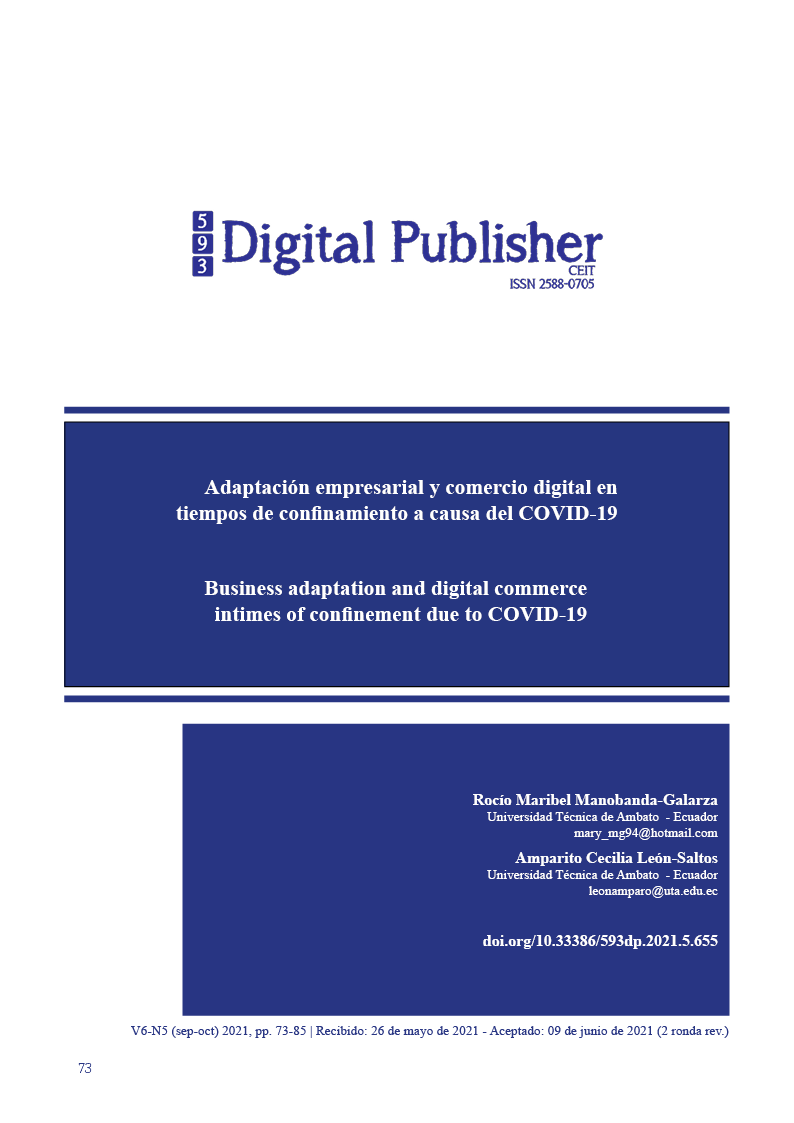Business Adaptation and Digital Commerce in Times of Confinement Due to COVID-19
Main Article Content
Abstract
Every organization operates in a specific physical, technological, cultural and social environment to which it must necessarily adapt to be successful. However, despite what is already known, the situation has become even more complicated with the presence of COVID-19, which has harmed most industries. Under this context, the objective of this study focuses on analyzing business adaptation and digital commerce in times of confinement in the financial cooperative sector, for which, the methodology used is based on a quantitative approach, supported by a bibliographic study modality and field. The population was structured by a total of 81 financial institutions to which the designed instrument was applied, which was structured by a total of 27 items under the Likert scale. Among the main findings, it stands out that 90% of the organizations have determined that the response of the institution to the current needs of its external clients during the pandemic has been positive, and in the same way, 73% of the managers of The COACs state that the interest groups that make up the institutions (shareholders, managers, workers, clients, partners, suppliers) have responded positively to the changes brought about by COVID-19, and the incorporation into their management of the use of digital channels related to web pages, WhatsApp service and social networks.
Downloads
Article Details

This work is licensed under a Creative Commons Attribution-NonCommercial-ShareAlike 4.0 International License.
1. Derechos de autor
Las obras que se publican en 593 Digital Publisher CEIT están sujetas a los siguientes términos:
1.1. 593 Digital Publisher CEIT, conserva los derechos patrimoniales (copyright) de las obras publicadas, favorece y permite la reutilización de las mismas bajo la licencia Licencia Creative Commons 4.0 de Reconocimiento-NoComercial-CompartirIgual 4.0, por lo cual se pueden copiar, usar, difundir, transmitir y exponer públicamente, siempre que:
1.1.a. Se cite la autoría y fuente original de su publicación (revista, editorial, URL).
1.1.b. No se usen para fines comerciales u onerosos.
1.1.c. Se mencione la existencia y especificaciones de esta licencia de uso.
References
Ballesteros, L., Silva, F., Mena, D., & Angamarca, M. (2019). Estrategias de marketing digital en empresas e-commerce: un acercamiento a la perspectiva del consumidor. 593 Digital Publisher CEIT, 4(5), 108–122.
CEPAL. (2020). Sectores y empresas frente al COVID-19: emergencia y reactivación.
Contreras Contreras, F., & Matos Uribe, F. F. (2015). Gestión estratégica en unidades de información: planeamiento. Biblioteca Nacional del Perú.
Dhir, S., & Dhir, S. (2018). Organizational Capability and Performance Improvement : A Study of e-Commerce Firms in Indian Context. International Journal of Global Business and Competitiveness, 13(1), 35–51.
Fierro, I., Cardona Arbelaez, D. A., & Gavilanez, J. (2017). Marketing Digital: Una nueva herramienta para internacionalizar la educación. Pensamiento y Gestión, 43, 220–240. http://dx.doi.org/10.14482/pege.41.9704
Foronda Zapata, F. J. (2018). La adaptabilidad en las organizaciones. Una revisión teórica del concepto y los elementos que la configuran como una capacidad organizacional [Tesis de posgrado]. Universidad de Antioquia.
Frías Adán, J., & Véliz Fajardo, J. (2013). La adaptabilidad a los cambios imprevistos del entorno y la creación de capacidades para el autocontrol en la empresa. Técnica Administrativa, 12(1), 1–10.
Gaffar Khan, A. (2016). Electronic Commerce: A Study on Benefits and Challenges in an Emerging Economy. Global Journals of Management and Business Research, 16(1), 19–22.
Gómez Nieto, B. (2016). Análisis de la publicidad digital en los sitios web españoles de mayor audiencia. Razón Y Palabra, 20(93), 374–396.
González Macías, C. J. (2015). La adaptabilidad organizacional desde el enfoque de la teoría de contingencia y la escuela de configuración. Revista Global de Negocios, 3(4), 69–81.
Hernández-Sampieri, R., Fernández, C., & Baptista, M. (2014). Metodología de la investigación (6ta ed.). McGraw-Hill.
Hernández Mendoza, S. L., Hernández Mendoza, J. M., & Olguín Guzmán, E. (2018). Comercio electrónico como herramienta complementaria en las Pymes en México. Revista Científica Electrónica de Educación Y Comunicación En La Sociedad Del Conocimiento, 2(18), 245–273.
Herrera Acosta, J. F., Vásquez Torres, M. del C., & Jacobo Hernández, C. A. (2019). Tendencias de compra en el comercio electrónico por estudiantes universitarios; un caso de estudio. 593 Digital Publisher CEIT, 6(4), 61–73. https://doi.org/10.33386/593dp.2019.6.136
Keikha, F., & Sargolzaei, E. (2017). Designing two-dimensional electronic business-to-consumer models’ map by fuzzy delphi panel. Journal of Theoretical and Applied Electronic Commerce Research, 12(2), 21–36. https://doi.org/10.4067/S0718-18762017000200003
Mishra, A., & Mahalik, D. (2017). Impact of online-ddvertising on consumers. International Journal of Advanced Research, 5(6), 1935–1939. https://doi.org/10.21474/ijar01/4625
Olis Barreto, I. M., Galindo Olaya, Ó. J., & Reyes Ortiz, G. (2019). Gestión, adaptabilidad y resiliencia, factores clave en el proceso de re-organización en el medio ambiente empresarial colombiano. Revista Espacios, 40(6), 2.
Organización para la Cooperación y el Desarrollo Económico OCDE. (2019). Panorama del comercio electrónico políticas, tedencias y modelos de negocio. OCDE.
Özdemir, A., & Çam, H. (2016). The Importance of E-Commerce in Terms of Local Development: A Study in Turkey. International Journal of Business and Management Invention, 5(1), 9–16.
Palomino Pita, A., Mendoza Vargas, C., & Oblitas Cruz, J. (2020). E-commerce y su importancia en épocas de COVID-19 en la zona norte del Perú. Revista Venezolana de Gerencia, 3, 253–266.
Pesántez, A. E., Romero, J. A., & González, M. L. (2020). Comercio electrónico B2B como estrategia competitiva en el comercio internacional: Desafíos para Ecuador. INNOVA Research Journal, 5(1), 72-93. https://doi.org/10.33890/innova.v5.n1.2020.1166
Perdigón Llanes, R., Viltres Sala, H., & Madrigal Leiva, ivis rosa. (2018). Estrategias de comercio electrónico y marketing digital para pequeñas y medianas empresas. Revista Cubana de Ciencias Informáticas, 12(3), 17.
Pineda Escobar, M. A., & Cortés Ortiz, G. (2018). Cambio y adaptación organizacional. Una revisión de la literatura. Espacios, 39(37), 5.
Sternad, D. (2016). Adaptive strategies in response to the economic crisis: A cross - cultural study in Austria and Slovenia. Managing Global Transitions, 10(3), 257–282.
Toledo, A., & Armas, N. (2020). Tips de marketing en époas de COVID y Post COVID. CienciaAmerica, 9(2), 1–10.
Yokiris Guzmán de la Rosa, A. E. (2018). Adaptabilidad y proceso de cambio organizacional [Tesis de pregrado]. Universidad Rafael Landívar.
Zúñiga Goveo, E. J., Marchán Andrade, M. F., & López Aguirre, J. F. (2020). Modelo de negocio ecommerce en Ecuador. IAC Investigación Académica, 1(2), 38–52.



